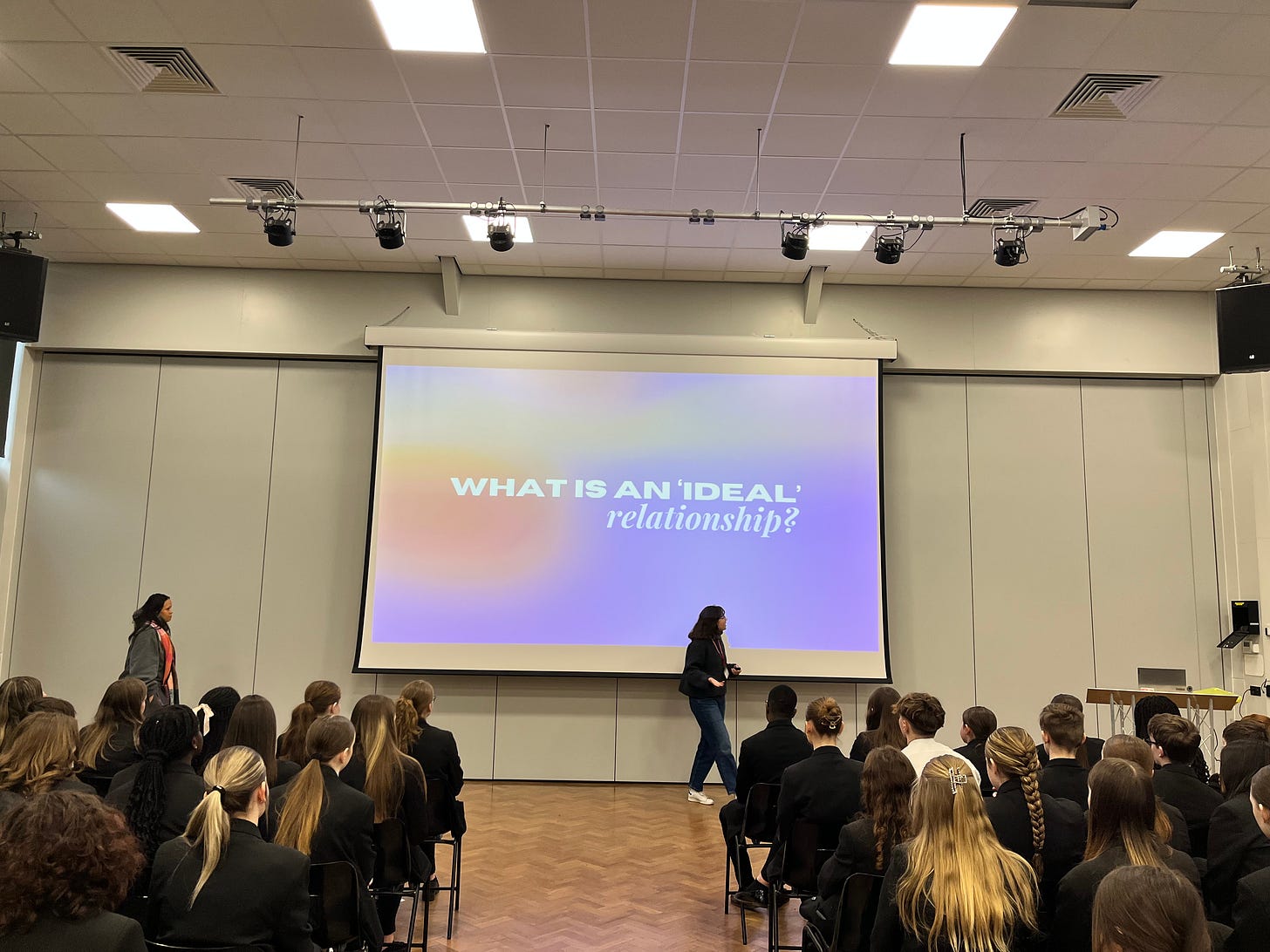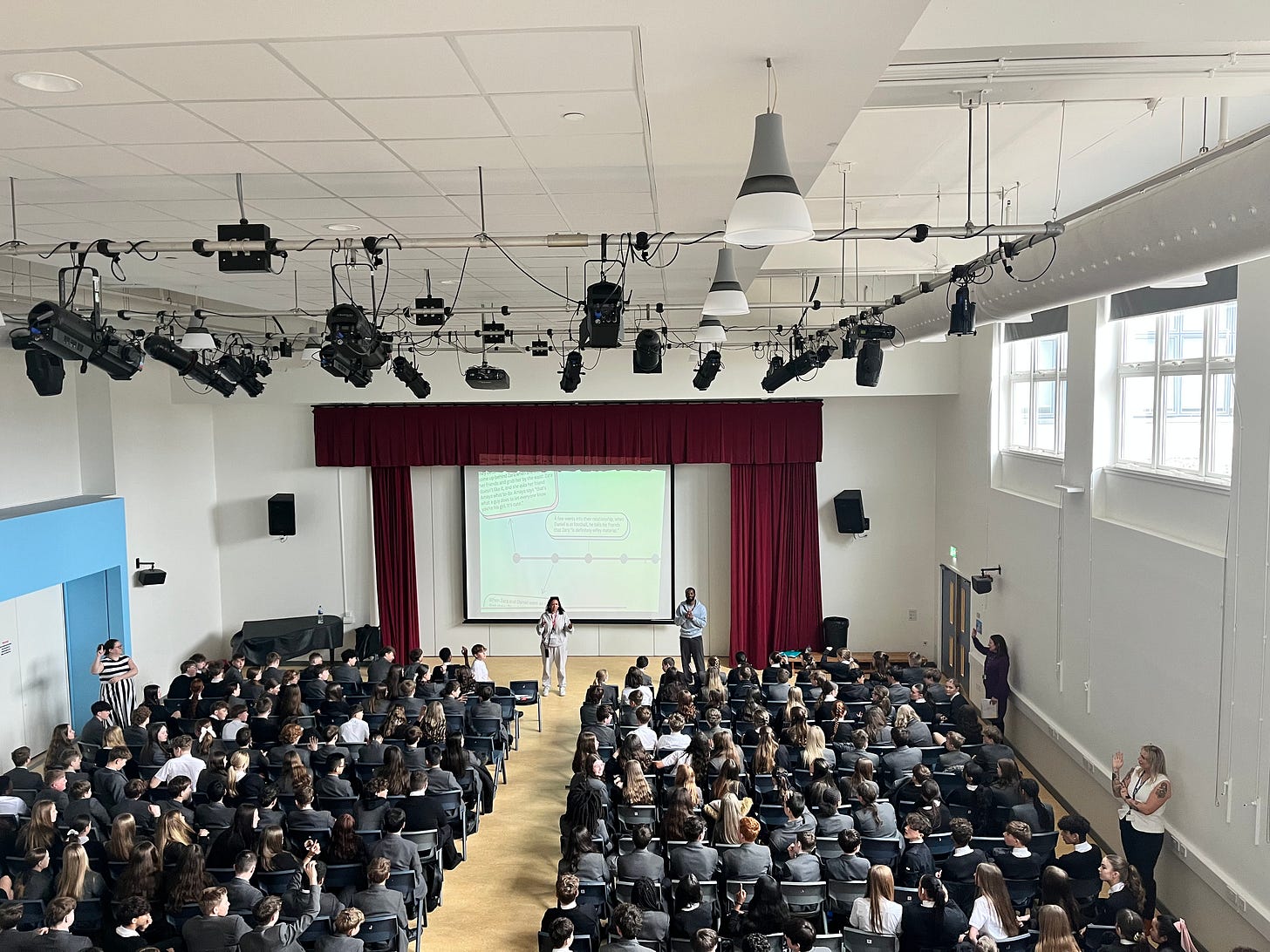Prevention is a long game
“I have seen abusive relationships in my family. I don’t want to be like that. I really appreciate you coming in.” (Leon*, 15)
Written by Vanessa Hall.
At Everyone’s Invited, we believe that prevention is better than reactionary intervention. But how do we know that our message is getting through? And when will we start to see the impact of our work?
Invisible impact
Everyone’s Invited received a pot of funding in November 2024 to offer prevention education to any school in West Mercia (a region encompassing Worcester, Shropshire, Herefordshire and Telford) for free. Every week, we travelled hundreds of miles, basing ourselves in hotels surrounded by fields, touring schools, meeting teachers and speaking to hundreds of students.
In three months, we taught 10,502 young people about how our ideas about relationships are often informed by the entertainment industry, by pornography, by those more interested in selling an ‘ideal’ than reflecting the realities. We interrogated how gendered roles and stereotypes influence behaviour. How boys are socialised to be stoic and protective, while girls are raised to people-please and dismiss their own emotional and physical boundaries. We showed young people how these systems shape our culture and our fundamental ways of thinking. We taught them how to engage with sex and relationships in a way that is critical of gender norms and showed them how romantic relationships are too often informed by rape culture - the social normalisation and trivialisation of sexual violence.
While driving up and down the M40 motorway between London and West Mercia, I spent hours considering the level of impact our prevention programme was having.
Does it even work?
Although the talk that we delivered was highly interactive, facilitating discussions and positive engagement, it was hard to gauge the impact that we had within that hour. While students slowly shuffled out of the room, I studied their faces and body language. What were they thinking?
Very often, their expressions were hard to read. Understandably, they seemed anxious to get to their next lesson. ‘That’s okay’ I would reassure myself, ‘I’ll read the feedback forms and hopefully get a sense of our direct impact from them’.
I would hand out feedback forms with trepidation to a group of students at the start of every session, urging them to fill them out honestly at the start and at the end of our workshop. Encouraging teenagers to put their feelings to paper - let alone resisting the urge to crumple, rip or create origami with it - felt like a thankless task sometimes.
It was only when we got into the car, or had a moment to pause in a local cafe, that we fully realised our impact.
“I liked how supportive and inclusive you were… It felt like it was a safe environment and like everyone had a voice”, said one young person. Another liked that it “felt like a safe space environment where everyone was allowed a voice”.
Many students commented on their increased empathy towards other children, particularly those that had different experiences to them. One student wrote: “I will make sure to not to pressure boys because they face stereotypes as well.”
Another added: “I realised boys can also feel pressured” because “men often aren’t mentioned.”
The feedback forms were anonymous, which was essential for encouraging honesty and vulnerability. Getting students to open up to us in person was a different story.
Prevention is a long game
When you’re a teenager, conformity is king. Which is why we never pushed students to speak out, or to ask questions. We knew that if a student wanted to come and speak to us, they would.
One thing I have learnt through six years working in the education sector is to never make assumptions about a group of young people.
One cold morning in March, myself and one of our fantastic facilitators Matty were wrapping up a talk with a group of Year 11s in Wem, Shropshire. A student made a beeline for Matty and me. I assumed that he wanted to ask Matty where his shoes were from (they were a particularly popular type of Salomons and had received many compliments that week.) But this student, let’s call him Leon* was different.
He asked us both for a handshake, and said “Thank you so much. I have seen abusive relationships in my family, and this talk really spoke to me. I am in a relationship myself and I don’t want to be like that - that’s why I really appreciate you guys coming in”.
It struck me that had Leon not come up to us, I would have been completely oblivious to the impact our talk had had on him. It got me questioning how many students might have had similar insights.
Holding the faith
Impact can be invisible. It is crucial that within this work we acknowledge that our impact may only be visible ten years post intervention. When domestic abuse rates drop within particular areas, maybe then the tangible, numeric impact of education will become apparent. What is clear for now - every single one of those 10,502 young people can be part of creating a positive ripple effect within their communities.
We might not see immediate effects, but prevention efforts require us to hold the faith that we are slowly but surely shifting perspectives. We can and will keep pushing for change within communities across the UK.
*not his real name






